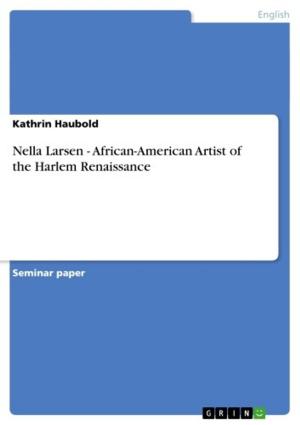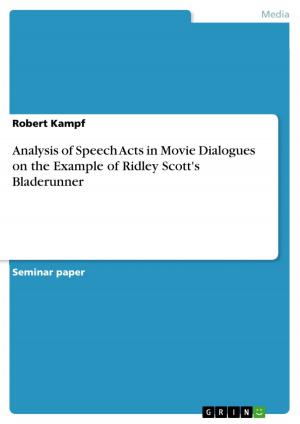The Development and Humorous Use of Fairy Tales by the Example of Little Red Riding Hood
Nonfiction, Reference & Language, Study Aids, ESL, Foreign Languages| Author: | Melanie Kloke | ISBN: | 9783638690522 |
| Publisher: | GRIN Publishing | Publication: | April 16, 2007 |
| Imprint: | GRIN Publishing | Language: | English |
| Author: | Melanie Kloke |
| ISBN: | 9783638690522 |
| Publisher: | GRIN Publishing |
| Publication: | April 16, 2007 |
| Imprint: | GRIN Publishing |
| Language: | English |
Seminar paper from the year 2006 in the subject English - Pedagogy, Didactics, Literature Studies, grade: 1.3, University of Paderborn, 14 Literaturquellen, 3 Internetquellen entries in the bibliography, language: English, abstract: 'Once upon a time...' - At the beginning of a text these words already make obvious that the recipient is dealing with a fairy tale. Fairy tales are known all over the world, independent of age groups and social status. The most famous versions have been written by the Brothers Grimm, even though they were neither the first, nor the last authors of fairy tales. Instead, these stories have a very long tradition rooting in the culture of primitive people who expressed their own experiences by telling each other folk tales. Since then, every era and culture had tales like these, either adaptations of the original ones, or new stories always dependent on the respective time and situation, until the well-known fairy tales developed which are though to have been written for children. Today it is known, that this kind of literature is actually not only supposed to be for children. 1 Furthermore, the development of fairy tales didn't stop in the 19 th century but is still in progress. By means of new media and modernised, often humorous, versions of the stories, they are still up-to-date and there exist versions for every age group. 2 One of these tales is the famous 'Little Red Riding Hood'. With origins in the medieval storytelling tradition it has become a very popular folktale rewritten by different authors of various nationalities. Even today it is still a popular basis for stories, parodies or cartoons. Also at school, fairy tales like Little Red Riding Hood can be used in their various versions and genres, either in its original version as a folktale or as a humorous story. Using this kind of stories in school can be used to bring fun into the class as well as to make pupils familiar with the genre of humorous stories used to express certain grievances in the society. In the following, the development of the fairy tale as a whole and of 'Little Red Riding Hood' in particular will be displayed. Afterwards the use of fairy tales in the classroom will be discussed, before the other use of the tale, its use as a humorous story and its use and function at school will be shown. Again, special attention will be paid to the example of 'Little Red Riding Hood.' [...]
Seminar paper from the year 2006 in the subject English - Pedagogy, Didactics, Literature Studies, grade: 1.3, University of Paderborn, 14 Literaturquellen, 3 Internetquellen entries in the bibliography, language: English, abstract: 'Once upon a time...' - At the beginning of a text these words already make obvious that the recipient is dealing with a fairy tale. Fairy tales are known all over the world, independent of age groups and social status. The most famous versions have been written by the Brothers Grimm, even though they were neither the first, nor the last authors of fairy tales. Instead, these stories have a very long tradition rooting in the culture of primitive people who expressed their own experiences by telling each other folk tales. Since then, every era and culture had tales like these, either adaptations of the original ones, or new stories always dependent on the respective time and situation, until the well-known fairy tales developed which are though to have been written for children. Today it is known, that this kind of literature is actually not only supposed to be for children. 1 Furthermore, the development of fairy tales didn't stop in the 19 th century but is still in progress. By means of new media and modernised, often humorous, versions of the stories, they are still up-to-date and there exist versions for every age group. 2 One of these tales is the famous 'Little Red Riding Hood'. With origins in the medieval storytelling tradition it has become a very popular folktale rewritten by different authors of various nationalities. Even today it is still a popular basis for stories, parodies or cartoons. Also at school, fairy tales like Little Red Riding Hood can be used in their various versions and genres, either in its original version as a folktale or as a humorous story. Using this kind of stories in school can be used to bring fun into the class as well as to make pupils familiar with the genre of humorous stories used to express certain grievances in the society. In the following, the development of the fairy tale as a whole and of 'Little Red Riding Hood' in particular will be displayed. Afterwards the use of fairy tales in the classroom will be discussed, before the other use of the tale, its use as a humorous story and its use and function at school will be shown. Again, special attention will be paid to the example of 'Little Red Riding Hood.' [...]















